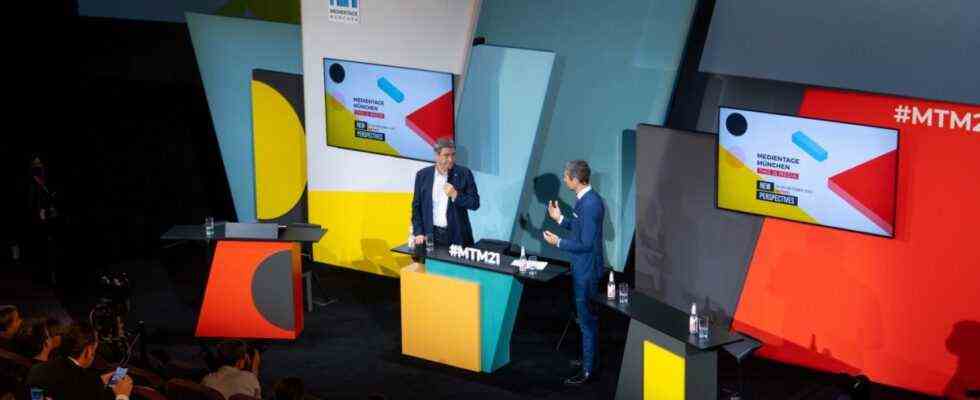“The full renaissance” comes to mind here in the Antiquarium of the Munich Residence, says BR director Katja Wildermuth. She gives the dinner speech at the long banquet table, the antiquarium is the oldest surviving room in the residence, adorned with a lush ceiling fresco. Duke Albrecht V had the hall built in the 16th century for his collection of ancient sculptures. A fabulous fountain decorated with shells greets you in front of the entrance. On this evening, 60 invited guests from media boards and Bavarian politics sit under angels and antique busts.
The host is Prime Minister Markus Söder. On the occasion of the Medientage Munich industry get-together, which he also opened on Monday lunchtime, he is now giving a state reception. A dinner for the guests, the press people can listen to the table speeches from the edge of the state room. Katja Wildermuth, who holds a doctorate in history, thinks in her speech that the Renaissance atmosphere is a very suitable setting. “There are only a few historical epochs that are characterized by similarly profound upheavals”, and that brings you to the status quo of the media landscape, which this evening at the Residenz will be about.
A media landscape that does not shine in full opulence, but faces challenges. To name just a few that echo through the vault this evening: new forms of communication, the power of streaming platforms, data security, filter bubbles, fake news. And if Markus Söder has his way, who already spoke on the subject at noon at the opening of the media days: The reporting before the federal election was “uninspired”, at least until September bypassed the interests of the voters.
Is it the journalists or the politicians who make the election campaign irrelevant?
Instead, trivialities, résumés and false laughs were discussed, and the content was too little, complains Söder. Dissatisfaction with the media is also distributed individually, so Wildermuth counters the criticism of the Prime Minister in her speech, because the big unifying media campfire no longer exists. The audience differentiates itself, partly it wants to see the regional news on television, partly it wants to quickly consume summaries on the mobile phone in the subway. And then there is the problem that the public broadcasters have to save.
The media days started at noon. Daily Topics-Moderator Ingo Zamperoni moderated in the IMAX cinema hall and asked Markus Söder there, after his complaint about the campaign coverage, the question of chicken and egg. Is it the journalists or the politicians who make the election campaign irrelevant? Certainly, Söder admitted, the relationship between journalists and politicians is more symbiotic than one would think. And the politicians were part of getting out of prime ministerial conferences – just like the journalists who ask for information by text message. For a prime minister, the relationship with journalists is of course a constant topic, but the media days are actually supposed to be about the broad lines of the industry, about “new perspectives”, according to this year’s motto.
At the evening banquet table, Markus Söder then gives a greeting in which he demands that everything must be faster and more modern, from changing the state media treaties to guaranteeing the sovereignty of American streaming platforms to the clean separation of attitude and craft in journalism. He is “moved” by the hatred in social media, but above all by “the nonsense”. Opinions and opinion-makers on the Internet are becoming more and more brutal, said the Prime Minister, and who knows how many of them are bots. “The algorithms have to be changed”, demands Söder, platforms are held responsible. A lot of work is imminent, media companies have to be taken with them on the way to the digital transformation, because “analog” and “digital” do not just stand for distribution channels, “but for a cultural issue”. And speaking of culture, the BR is of course not just a broadcasting company, according to Söder, but a cultural institution.
Wildermuth’s Lamento: You have to save elsewhere to implement new ideas for the future
When it came to self-praise, they both agreed: Already at noon, Söder raved about the “vigorously vital Munich” and Bavaria as the only politically “traffic light-free state”. At the end of her speech, Katja Wildermuth claimed that the BR was one of the three most respected institutions in the state for the people of Bavaria, together with BMW and only just behind FC Bayern. At the celebratory dinner, she does not reveal how she knows this. But where should one, presumably the subtext, be deleted from such a popular radio station? Wildermuth returns the question to the ballroom: in the crime thrillers? In the reports? Or for entertainment programs from Franconia? On the other side of the table, Söder denies the last suggestion with a forefinger amid general laughter. With the bloated bureaucracy? With the parallel structures? In terms of personnel costs? Counter-proposals that nobody makes in the state room.
It seems a bit as if Katja Wildermuth has been collecting questions rather than answers during her tenure at BR. How to deliver good content for less money? How to modernize at the same time? And how to keep up with Netflix and the other online media that not only attract the attention of the Bavarian audience? “With what content and what profile do we want to go into the future?” Asks Katja Wildermuth. How about excellent? Instead, Wildermuth continues with the lament: To implement new ideas for the future, you have to save elsewhere. It is clear that any prioritization in favor of new efforts is linked to serving a loyal and relevant user base and the public less. “But,” says the director, “it doesn’t help.”

